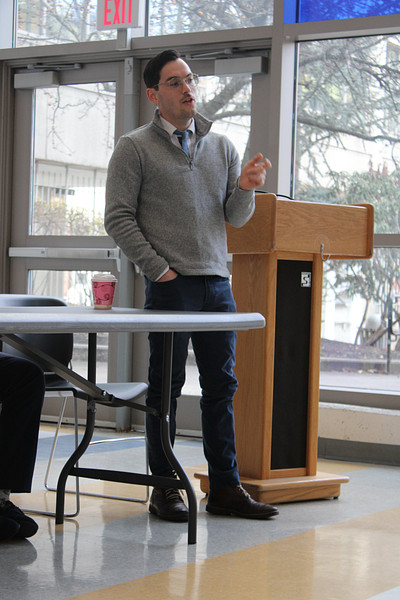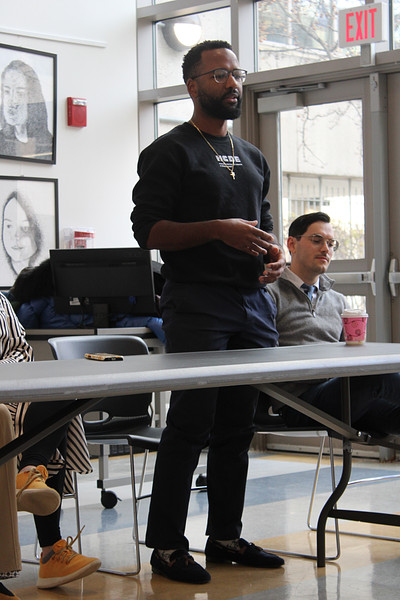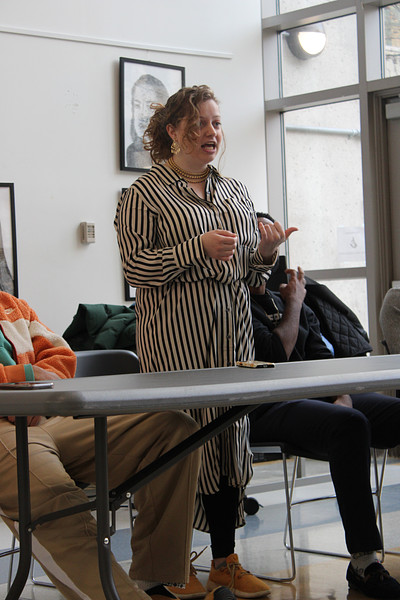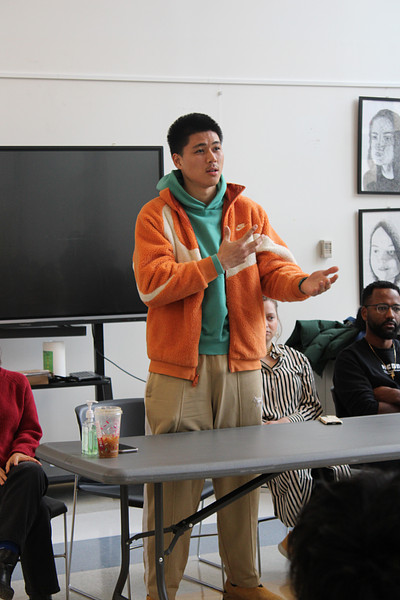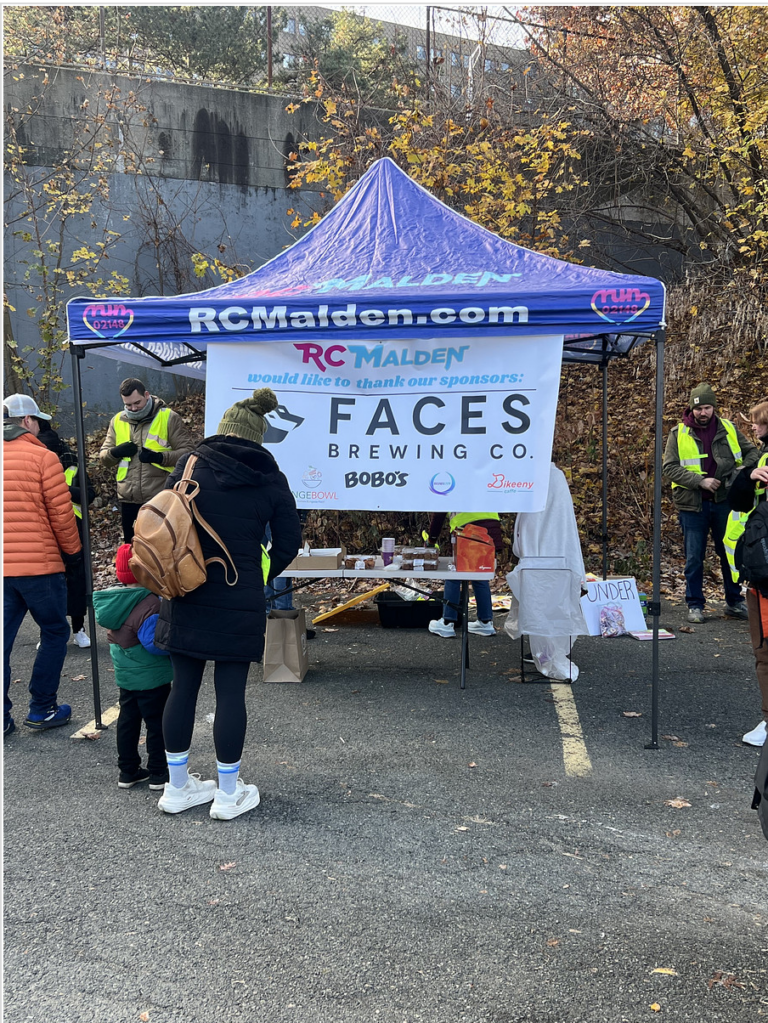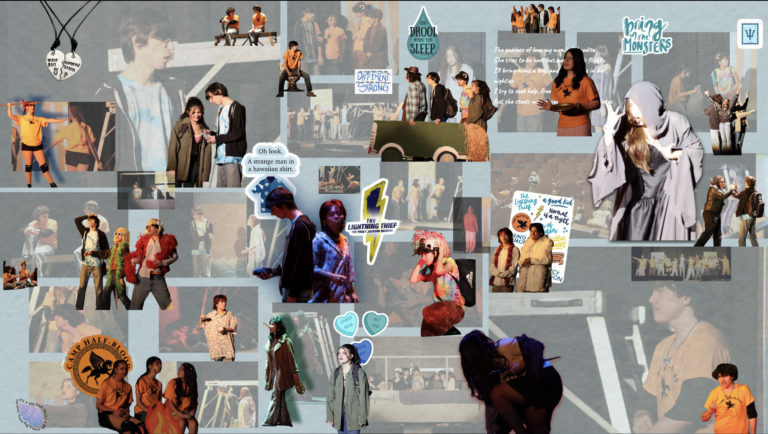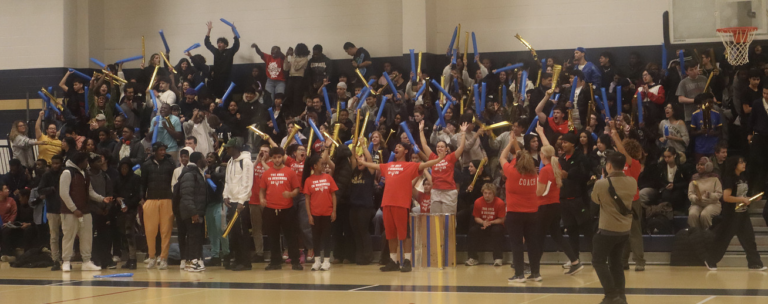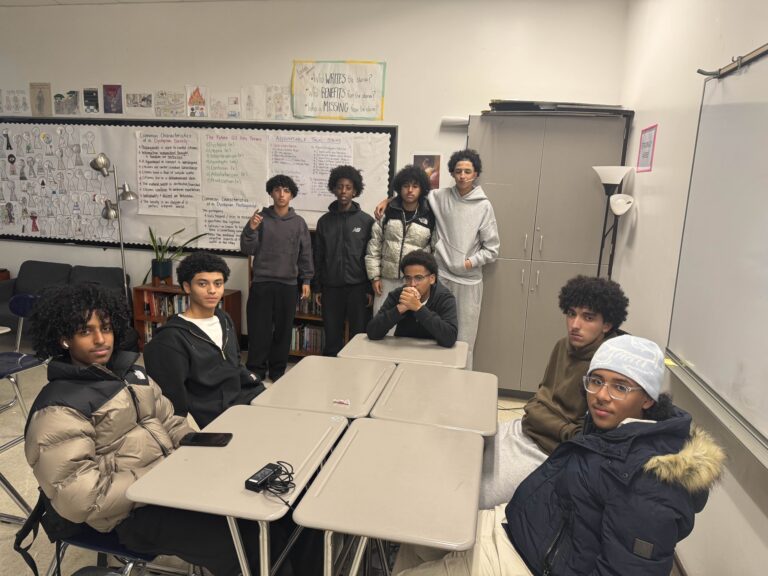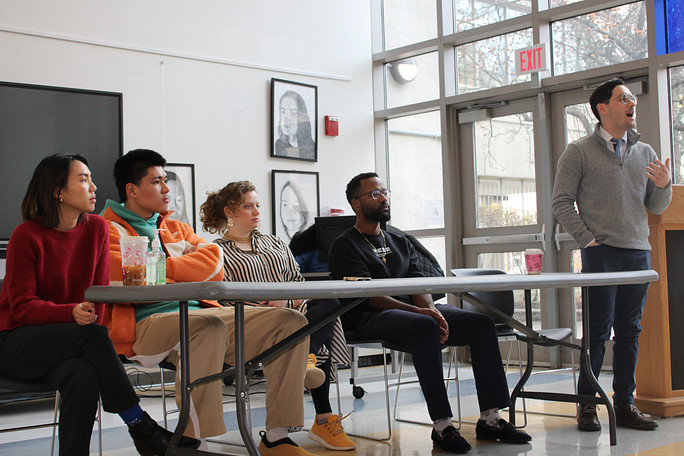
Civics affects everyone. By definition, it is the study of the rights and responsibilities of individuals via citizenship. In the US, that includes the right to vote and the duty to pay taxes. On December 7th, five people who work in civics came to Malden High during Advisory to discuss their roles and responsibilities, and how it affects people.
The five introduced themselves, starting with Claudia Chung, a legislative aide for State Representative Steve Ultrino. “I do a lot the communications… policy work, civil rights bills, tournament laws, among other things,” Chung stated.
Sitting next to Chung was Eric He, the Youth Outreach Coordinator for Chinese Culture Connection and a videographer “promoting cross-cultural communication.” He travels internationally to learn from other countries and cultures, most recently to Korea. All of his travel journeys are documented on his YouTube channel.
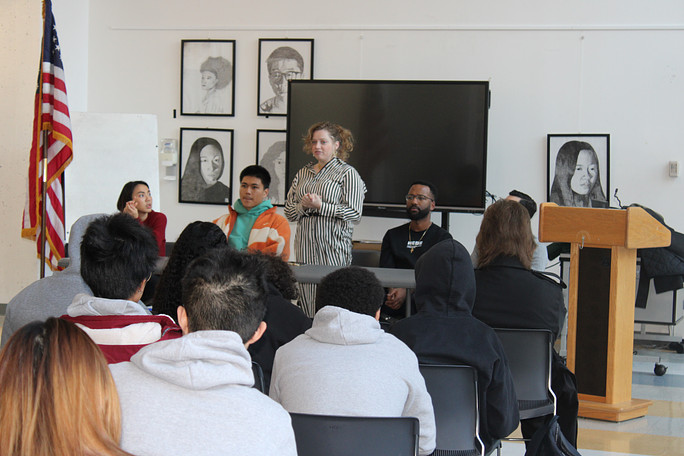
The third at the table was Sarah Zeiberg, the District Director for Senator Jason Lewis. Specifically, Zeiberg works with “special events and unique projects” and determines “why the state needs to get involved.” Zeiberg is also a Malden High School alum, so she came back to this discussion to share that anyone can get involved.
Next to Zeiberg was Danny Aguiar, who works as the Outreach Specialist for the City of Malden’s Office of Strategic Planning and Community Development. His job is “to drive community participation of the Housing Rehab Program, which focuses on providing to low-income constituents with funding to make their home a safer, healthier, and more comfortable.” He further explained, “A few examples are mitigating health hazards such as lead, asbestos, mold, roof repair, structural repairs amongst much more.”
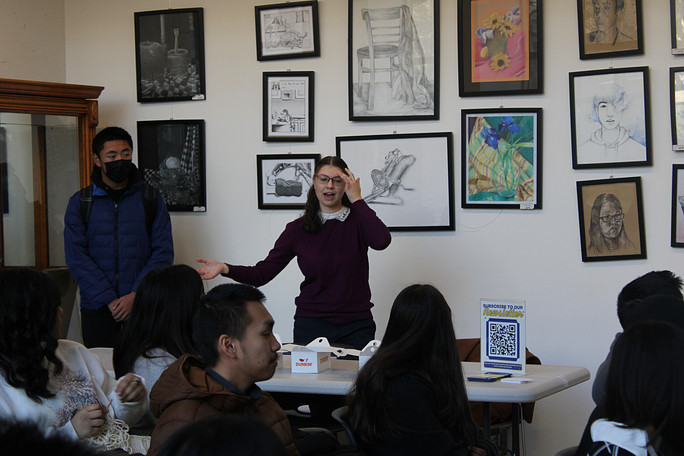
Finally, sitting at the end of the table, was Andrew Epifanio, a Policy Researcher for the Joint Committee on Education. He explained that his work focuses on getting “grant funding” for the town. “They all revolve around programs for the city.”
After their brief introductions, Chung opened the floor for comments: “We’re here to provide some insight to what it’s like to work in government and for your community.”
The first question came from senior Makeila Scott, who asked Chung to explain more about her role as a legislative aide, and how she ties that into “helping your community.” Chung replied that “all of our bills come from the community. People reach out to our office with a certain issue… and maybe there was a gap or no law regulating that part. So we write something to change that.” Specifically, Chung researches why these complaints happen and sees if there is something that needs to be changed to help the community.
Scott then asked a follow up question about these bills that Chung proposes: “How long is the process between when you write a bill and when it’s heard?” Chung commented that the deliberation process takes a long time: “Everyone has to review it and it will go from committee to committee, so you have no idea how long it will take.” She further commented that the length of time depends on the issue: “Some things that are urgent—like when there was flooding in Western Massachusetts—they really need to pass a bill so that they can get money immediately.” The more urgent the issue, the faster it will pass.
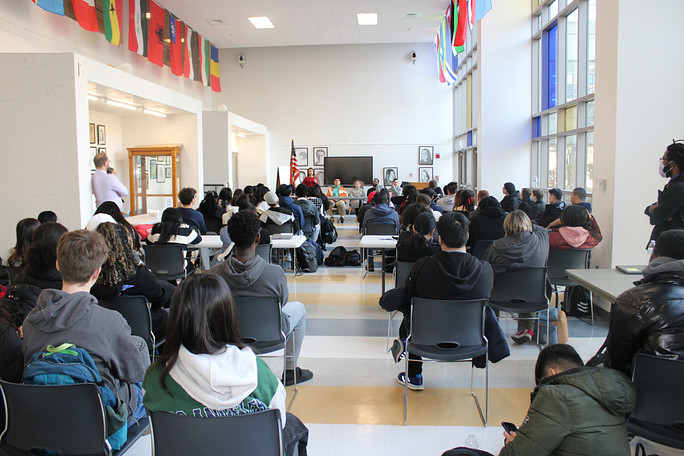
“There’s thousands of ways to address an issue, it’s about finding the right one.” – Sarah Zeiberg
Zeiberg added on to her comment, saying that for her, “the primary job is filing bills and pushing for them.” To do that, the best method “is talking to community members… so even if we are getting big bills passed we still, as a legislature, respond to our community’s needs.”
One example within Zeiberg’s work is “meeting with state and local partners, sometimes even people in the federal government, to talk about flooding in the eastern part of Malden.” She jokingly added, “The best thing we do as aides is be really annoying on your behalf.” Then in a more serious tone, she explained, “So if something is bothering you, call us, email us, ask us. It’s our job to find out and if something is wrong, we spend most of our day fixing it for you guys.”
History teacher at Malden High, Kurtis Scheer asked the next question. “Could you guys describe some of the stuff you’re currently working on?”
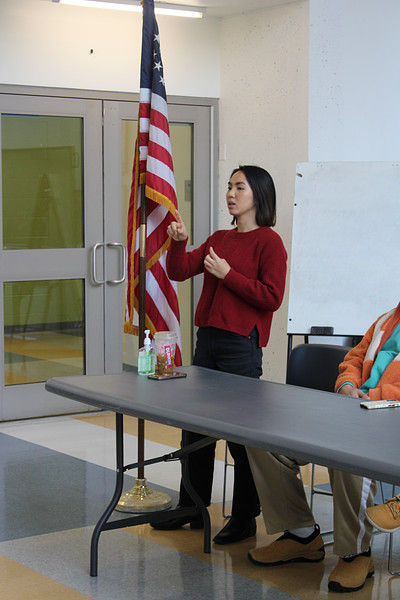
Epifanio answered first, describing the work he has been doing with the Education Committee. “There’s a few issues across the state we work on, all the way through 12th grade. One of the biggest issues this session is, ‘how do we make sure everyone has the same starting point?’” By this, he is referring to early education and childcare. “I think it gets a little more relevant to what it is we’re thinking about with social emotional learning and mental health.”
Aguiar answered next, detailing his two current projects as a “Housing Rehab Specialist” and “Energy Advocate for the Mass Save CFP Program.” His current mission is to “gain more engagement for my programs. I’m working with a radio show to do a couple of podcasts.” He commented, “It’s kind of cool to coordinate that and be able to go on a podcast.”
His second project’s goal is to make Malden more inclusive. “There’s still a lot of people that are getting left behind and that’s what we’re working to fix.” The energy efficiency programs in Malden currently “serve a lot of the community,” but Aguiar’s goal is to include everyone.
Zeiberg asked a question to the crowd: “Does anybody here ride a bike or walk?” Nearly all hands in the crowd shot up at that, so she continued. “Cool, I’ve got a project for you guys. It’s a big bike path, basically, but it’s not just one or two streets.” Instead, it’s going to be ten miles long and connect Malden, Melrose, Stoneham, Reading, and more towns. “In theory, you could get yourself from Wakefield all the way to Roxbury without having to be in a car several times.”
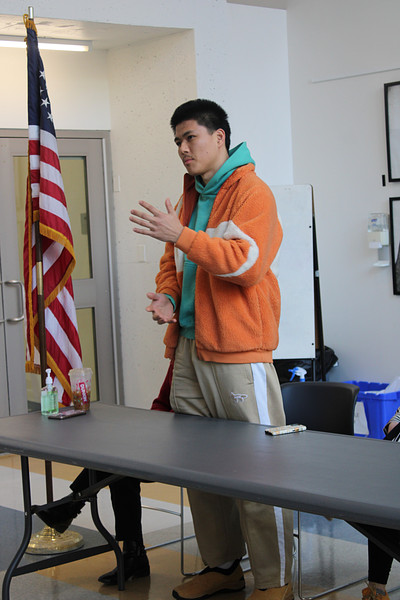
His current project is a “documentary for my organization, Chinese Culture Connection.” He started working on his YouTube channel back in 2020, and continues to build it even now. “Chinese Culture Connection invited me to go work on videos for them, so that’s my current mission.” As a recent college graduate, he has self-discovery to do—a lot of which he has done via his channel. “Being able to express the way you see the world, that’s what creativity is for. That’s one of the most important ways to attract other people to fight back against oppression.”
Chung asked another question to the crowd; “Does anyone here speak a different language at home?” More than half the crowd raised their hands at this, so Chung continued. “We’re working on expanding our language access.” Chung added that she speaks four languages: Mandarin, Cantonese, English, and French. “I think that part of the issue is a lot of people in the community are not getting the resources they need available to them in the language they speak at home.”
To help mitigate this issue, Chung’s job recently has been to “translate all our materials into Chinese and then work with the language access coordinators; they need to make sure that we have resources in different languages.” This is especially important because of the legalese around this issue. “There are rules set by the federal government that nonprofits have to follow. They have to give information and resources in different languages.”
Although there was not time for much more discussion, there was a lot of information shared with the dozens of students who attended.

